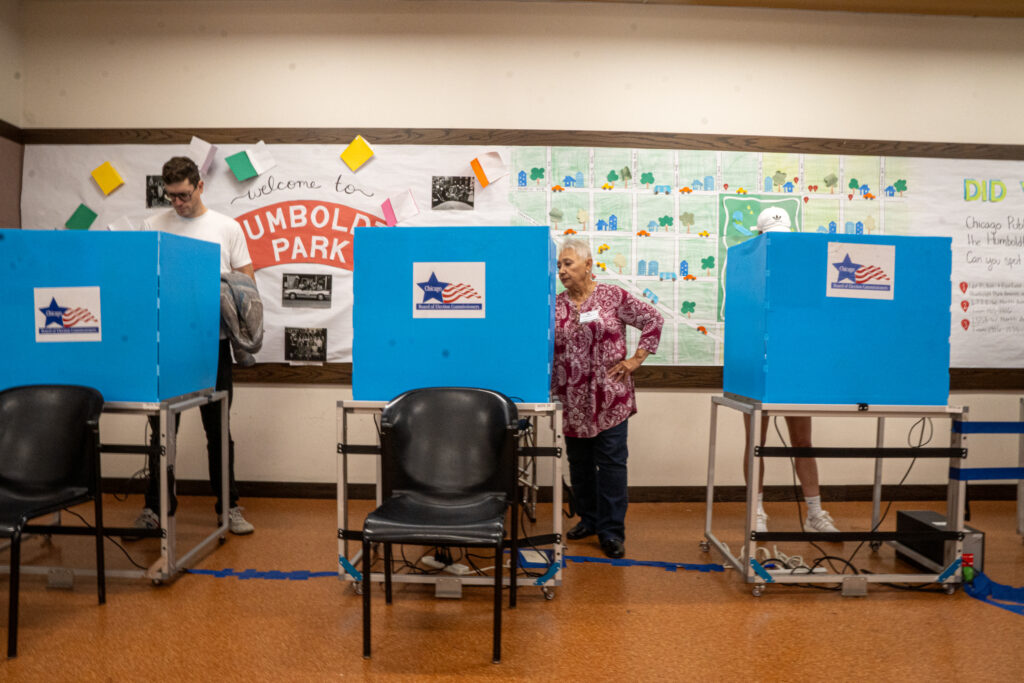As the 2024 presidential election approaches, many Latino voters, the fastest-growing voting block, express distrust, confusion and anxiety about choosing candidates.
“I often feel that when going to vote, I change my mind because of the anxiety,” said Unique Gonzalez, 22, a Mexican-American resident of Chicago. “Because I’m American and live in a democracy, my vote should matter, right? I believe that is only true to an extent.”
With a family income that falls below the average American and as a member of a historically marginalized population, Gonzalez said she feels she lacks the money and connections that might make her vote more significant. Because of that, Gonzales plans to sit out the election for the fourth year.
An estimated 36.2 million Latinos are eligible to vote this year, up from 32.3 million in 2020, according to a Pew Research Center poll. Latinos account for 50% of the total growth in eligible voters during that time.
Miguel Loza-Cruz, 18, a student at Columbia College Chicago and a first-generation voter, will be casting a ballot for the first time this year.
“I really care about the immigration policies deeply. It’s something near to my heart,” Loza-Cruz said.
Democratic candidate and Vice President Harris has campaigned for comprehensive immigration reform, backing the sweeping bipartisan Senate border bill, which stalled in the Senate in May, rejecting mass deportation of undocumented immigrants and advocating for paths to citizenship for undocumented spouses of citizens and DACA holders.
In contrast, Republican candidate and former President Donald Trump has said he would deport 15 to 20 million undocumented individuals with the help of the National Guard and local police. He also opposes the Senate border bill, which would overhaul the process for seeking asylum in the United States and impose an “emergency authority” that would leave asylum fully out of reach for those crossing between ports of entry for much of the next three years.
Trump, who also attempted to revoke DACA, said he would reinstate his ban on people from select Muslim-majority countries entering the U.S., revoke automatic citizenship for certain U.S.-born individuals and stop President Joe Biden’s humanitarian parole for immigrants from Haiti, Nicaragua, Cuba and Venezuela. Harris also has stopped short of criticizing Trump’s plans for mass deportations.
Loza-Cruz said he has concerns about both candidates. A lot of politicians are just all talk, he said.
Fears over Trump’s plans are giving some Latino voters the urgency to head to the polls in November.
Angelica Ramirez, 22, immigrated to Chicago with six other siblings at the age of 5 under her father’s dual citizenship status.
“I never had to worry about that,” Ramirez said. “We came into the state with papers.”
But her uncles didn’t.
“It makes me nervous,” Ramirez said. “What if they get deported? They’ve been here longer than they’ve been out in Mexico. Some immigrants won’t teach their kids Spanish because they felt it’ll make them a target by ICE.”
When their grandmother passed away, Ramirez’ uncles, unable to leave the country, had to watch the funeral through a Facetime call.
Columbia College Student Zoe Davis Phillpotts, 26, born to first-generation parents, said she’s not a big fan of either candidate’s immigration policy, though she prefers Harris.
Phillpotts said her main concern is Trump’s support for another ICE raid such as the one in 2019, when Trump, then president, planned ICE raids targeting undocumented immigrants, focusing on those with criminal records, framing the operations as essential for public safety. This resulted in the widespread arrest of thousands of undocumented immigrants and the separation of many children from their parents.
Gonzalez said she feels the same. She wants to see more grace in the process. If someone is caught without papers they should be assisted in getting residency, before being dragged out the country, she said.

Whether Harris’ plan to reject mass deportation would change this is uncertain. The Biden Administration this summer was on track to match Trump’s deportation numbers, according to the Migration Policy Institute.
For Phillpotts, Harris’ positions seem “too liberal.”
“We should have a little bit of structure, more security for the border patrol for California and for Texas,” Phillpotts said. “I still don’t want a mass of immigrants coming into the country…not as a way to be conservative but for safety.”
Columbia College Chicago freshman, Jadzia Rojas, 19, said she’s unsure if she’ll vote as she doesn’t know how the process works.
“Nobody’s ever told me how to vote,” Rojas said. “Do I just put ‘Kamala Harris’ on a paper and that’s it? When do you actually go out and vote?”
Rojas planned to reach out to local peers to figure out how to head to the polls and cast her vote, as immigration is something she’s passionate about, yet hesitant when it comes to the candidates.
“You’d think candidates would want a modern approach with their proposals,” Rojas said. Trump “wants to go backwards in time with his” while for Harris, “it’s just what you want to hear. It sounds so good on paper and to the ear.”
Rojas said that while she has faith in Harris, she wants to do more research before completely backing her.
In response to challenges like these, Latinx organizations are stepping in to bridge the gap.
Mario Jimenez, a senior at Columbia College Chicago and Latino Alliance president, noted that efforts on campus have been aimed at empowering Latino students to take part in the democratic process.
“At Columbia, we have events encouraging students to vote, but our main goal is to empower Latino students through activities that help them learn about their culture,” Jimenez said “We believe it’s important to vote, so we encourage students to go to places where they can learn more about the candidates and officials running for office.”
Jamari Shelton is a broadcast journalism major at Columbia College Chicago.
- News analysis: Missourians take leading roles in Trump’s ‘weaponization’ of the Justice Department and election denial
- Commentary: Stars and Stripes’ legacy of editorial independence shows value of a free press
- News analysis: Trump’s handling of Minnesota investigations defies time-tested procedures and looks like a ‘cover-up in plain sight’
- St. Louis KDHX-FM radio disappears, but alums stage CRSTL comeback
- Remembrance: During a five-decade career Terry Ganey always got the truth and ‘wouldn’t take no for an answer’
